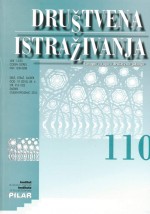Pridonose li osobne karakteristike nastavnika vrsti interakcije koju ostvaruju sa svojim učenicima
Do Personal Characteristics of Teachers Contribute to the Type of Interaction They Have with Their Students?
Author(s): Slavica Šimić Šašić, Izabela SorićSubject(s): Psychology
Published by: Institut društvenih znanosti Ivo Pilar
Keywords: student–teacher interaction; personal characteristics; self-efficacy; perfectionism; impulsivity; job satisfaction
Summary/Abstract: Some personal characteristics of teachers and teacher behaviors are associated with student achievement. The transactional model of the teaching–learning process (Huitt, 1995) assumed that personal characteristics of teachers affect the success of learning indirectly through teachers' behavior. The aim of this research was to investigate the predictive value of some individual teachers' characteristics for different behaviors of teachers, i.e. for different components of interaction that a teacher has with his/her students in the teaching–learning process. Foreign language teachers in secondary schools filled several scales and personality tests and evaluated what kind of interaction they have with their students by using the Scale teacher–student interaction (Šimić Šašić, 2008) and Support vs challenge in classroom interaction questionnaire (Mariani, 1997). The results show that individual characteristics of the teachers contribute to explaining some components of the teacher–student interaction, specifically: self-efficacy in student engagement explains the strategy of active teaching and the high support / high challenge, self-efficacy in strategies of teaching explains the high expectation of the student. The teacher's gender, age and perfectionism explain the authoritarian management style, job satisfaction, self-efficacy in student engagement and perfectionism contribute to the explanation of the teacher's negative attitude towards teaching, while only perfectionism contributes to explaining the low support and low challenge.
Journal: Društvena istraživanja - Časopis za opća društvena pitanja
- Issue Year: 19/2010
- Issue No: 110
- Page Range: 973-994
- Page Count: 22
- Language: Croatian

